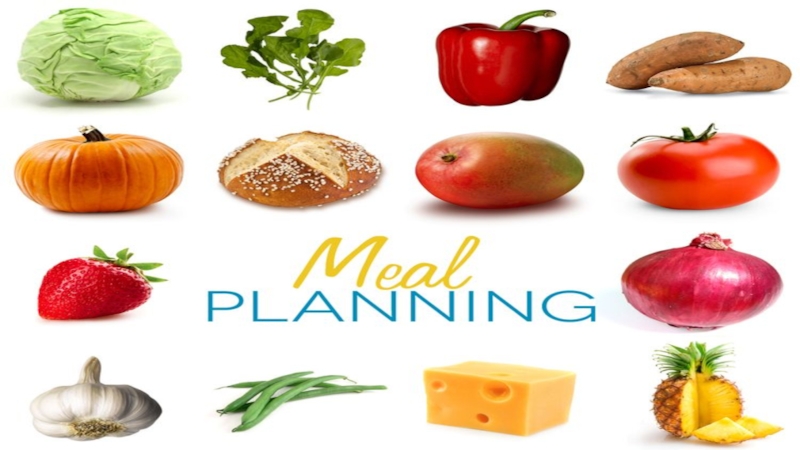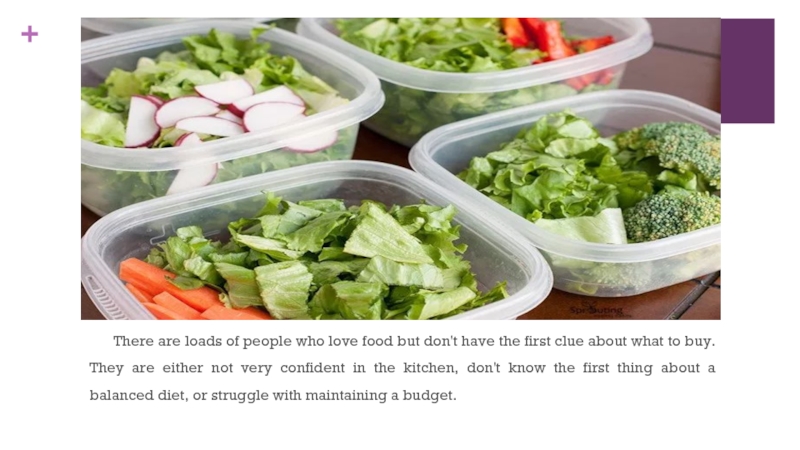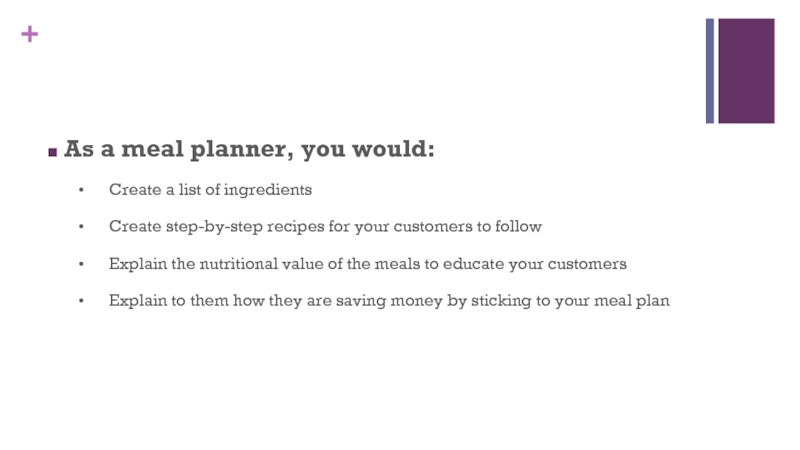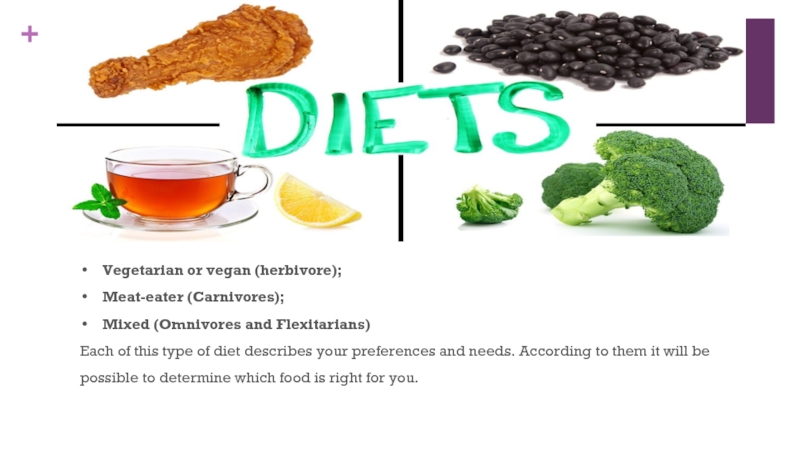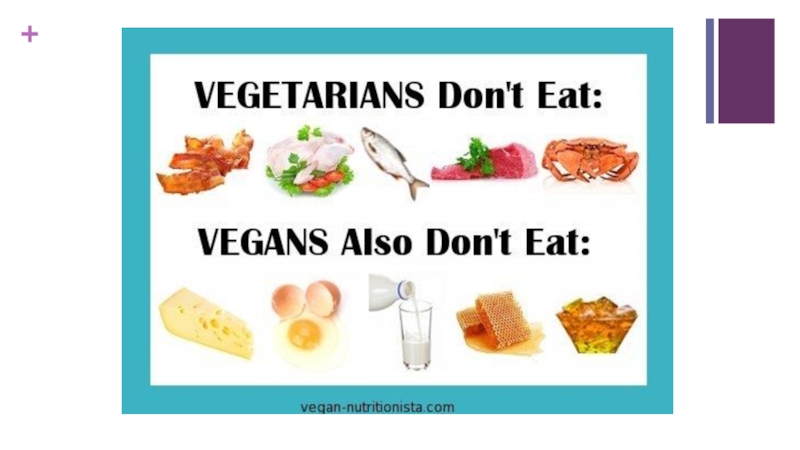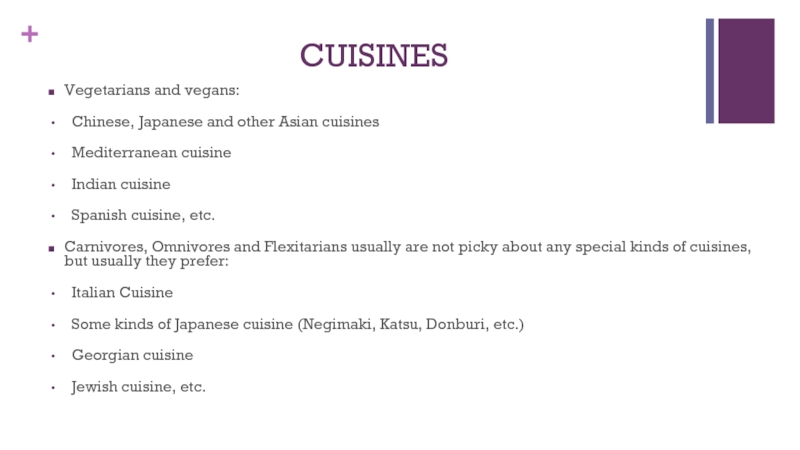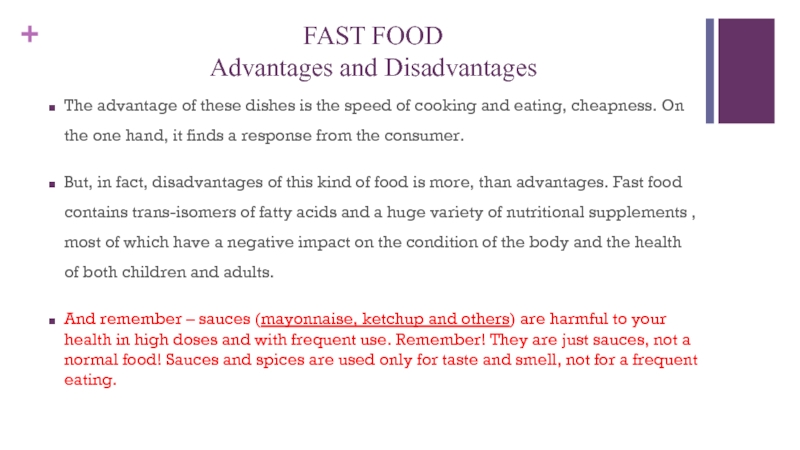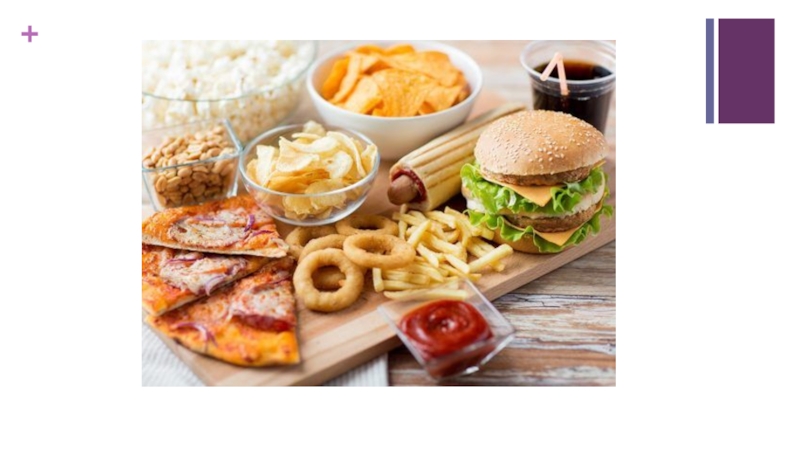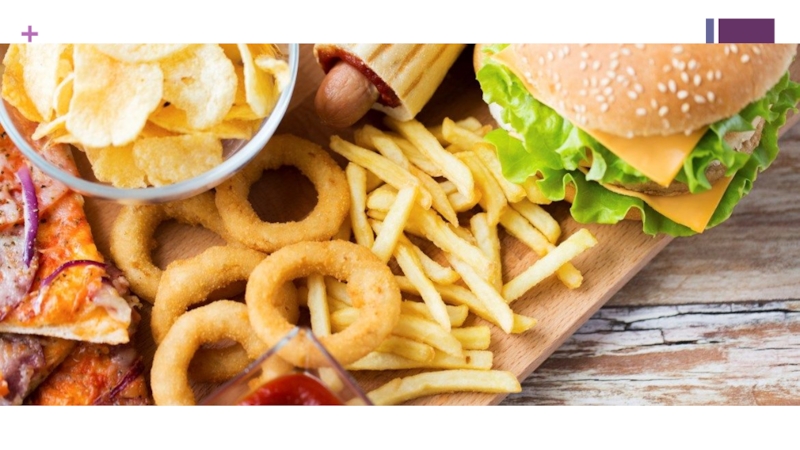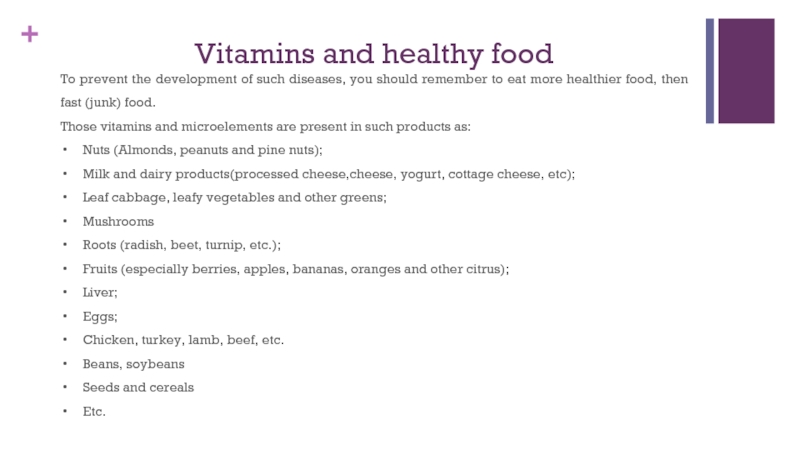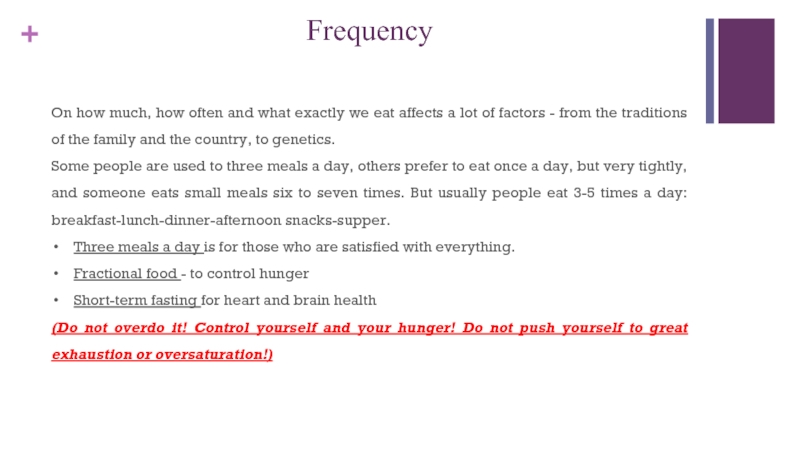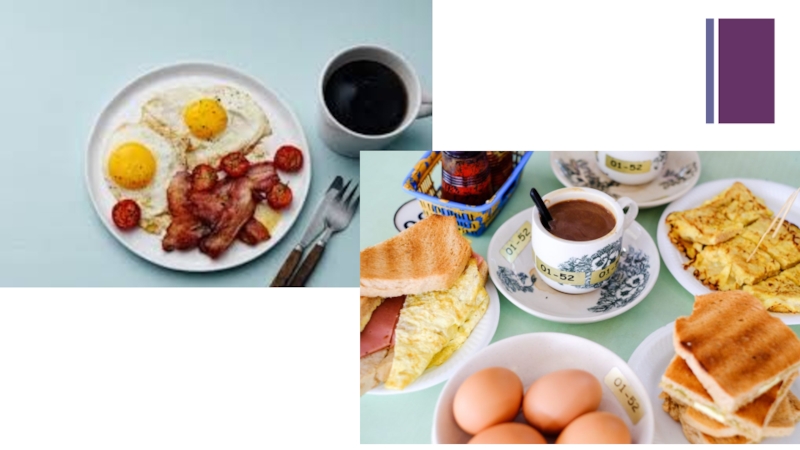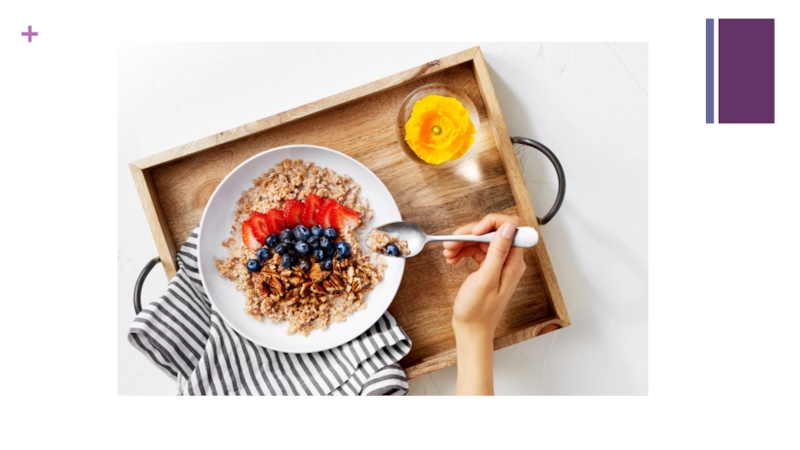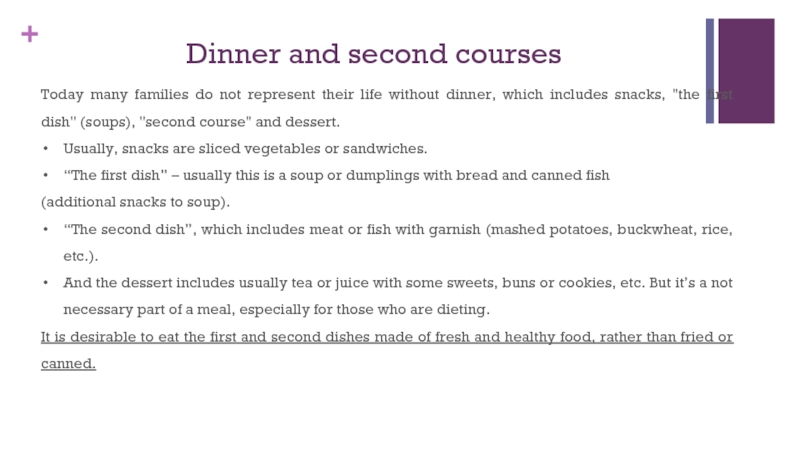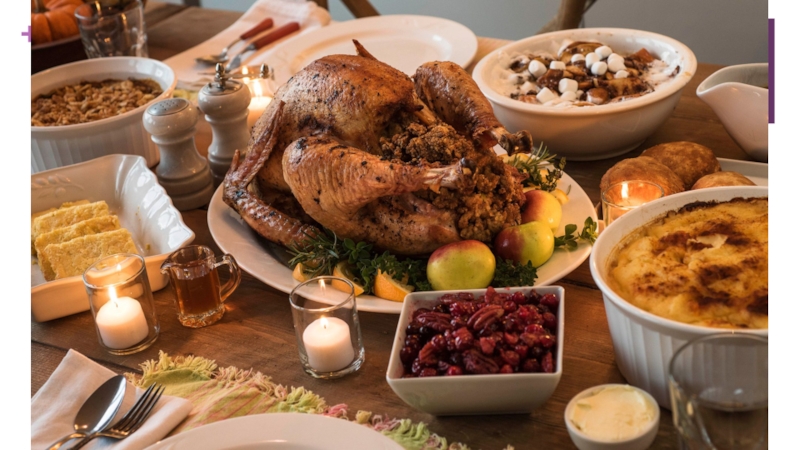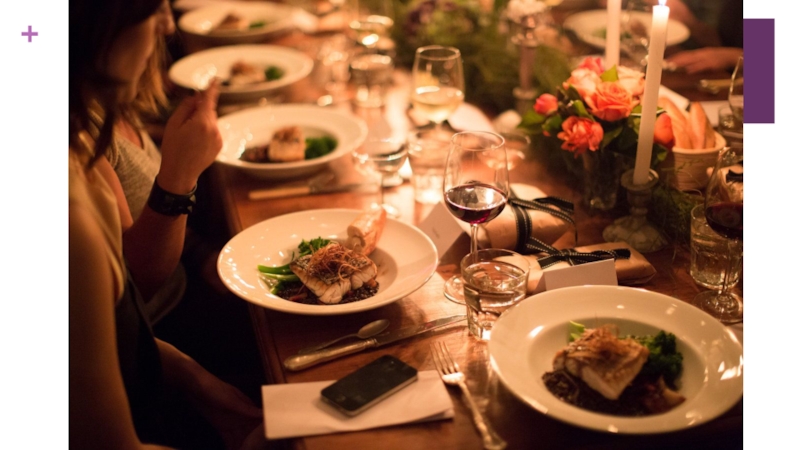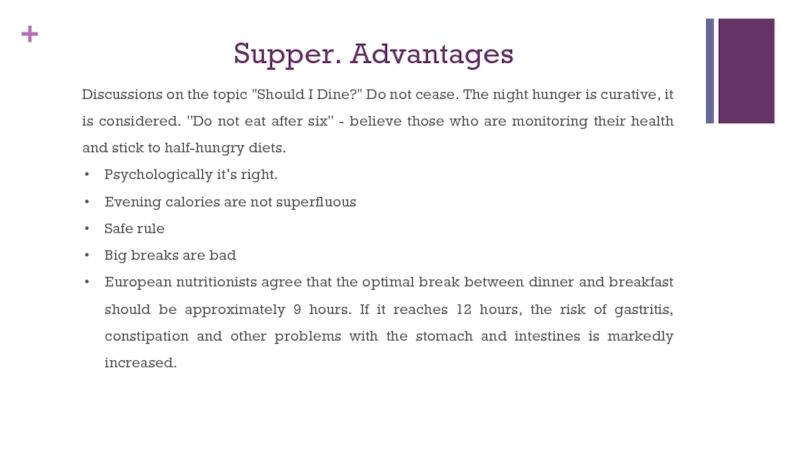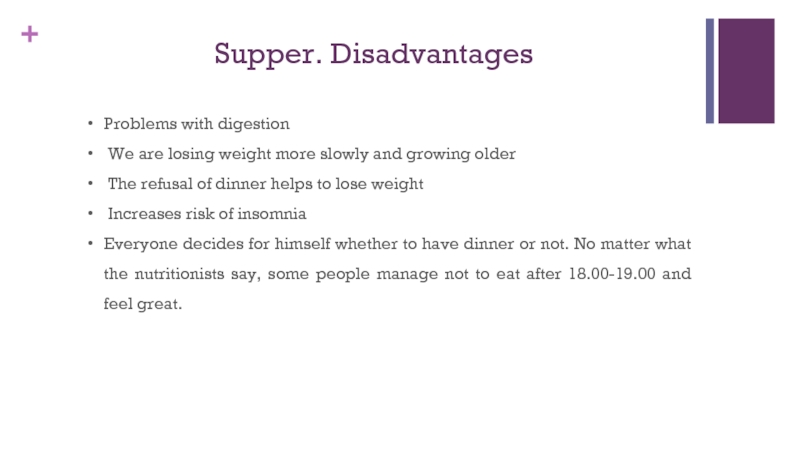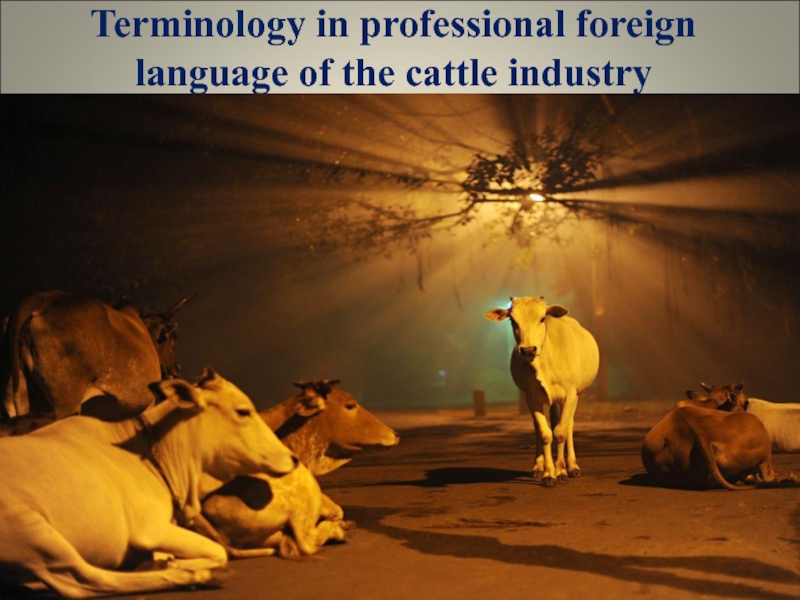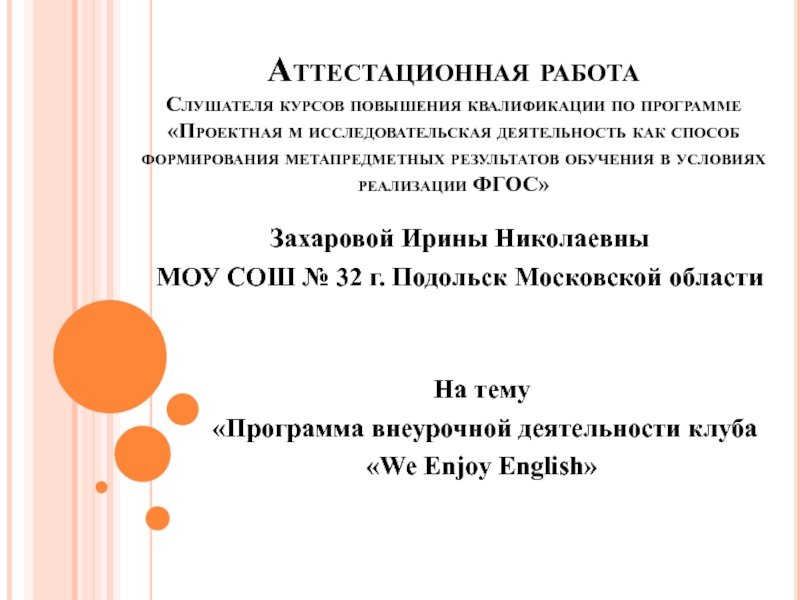- Главная
- Разное
- Дизайн
- Бизнес и предпринимательство
- Аналитика
- Образование
- Развлечения
- Красота и здоровье
- Финансы
- Государство
- Путешествия
- Спорт
- Недвижимость
- Армия
- Графика
- Культурология
- Еда и кулинария
- Лингвистика
- Английский язык
- Астрономия
- Алгебра
- Биология
- География
- Детские презентации
- Информатика
- История
- Литература
- Маркетинг
- Математика
- Медицина
- Менеджмент
- Музыка
- МХК
- Немецкий язык
- ОБЖ
- Обществознание
- Окружающий мир
- Педагогика
- Русский язык
- Технология
- Физика
- Философия
- Химия
- Шаблоны, картинки для презентаций
- Экология
- Экономика
- Юриспруденция
Meal planning презентация
Содержание
- 1. Meal planning
- 2. There are loads of
- 3. As a meal planner, you would:
- 4. Vegetarian or vegan (herbivore); Meat-eater (Carnivores);
- 5. Vegetarianism is the practice of abstaining
- 7. MEAT-EATING (CARNIVORES), OMNIVORES AND FLEXITARIANS
- 9. CUISINES Vegetarians and vegans: Chinese, Japanese and
- 10. FAST FOOD Advantages and Disadvantages The advantage
- 14. Vitamins and healthy food To prevent the
- 15. Frequency On how much, how often and
- 16. Breakfast The most important meal of the
- 19. Dinner and second courses Today many families
- 23. Supper. Advantages Discussions on the topic "Should
- 24. Supper. Disadvantages Problems with digestion We
- 25. How to save money by sticking to
Слайд 2 There are loads of people who love food
but don't have the first clue about what to buy. They are either not very confident in the kitchen, don't know the first thing about a balanced diet, or struggle with maintaining a budget.
Слайд 3As a meal planner, you would:
• Create
a list of ingredients
• Create step-by-step recipes for your customers to follow
• Explain the nutritional value of the meals to educate your customers
• Explain to them how they are saving money by sticking to your meal plan
• Create step-by-step recipes for your customers to follow
• Explain the nutritional value of the meals to educate your customers
• Explain to them how they are saving money by sticking to your meal plan
Слайд 4Vegetarian or vegan (herbivore);
Meat-eater (Carnivores);
Mixed (Omnivores and Flexitarians)
Each of this
type of diet describes your preferences and needs. According to them it will be possible to determine which food is right for you.
Слайд 5 Vegetarianism is the practice of abstaining from the consumption of
any kind of meat and may also include abstention from by-products of animal slaughter (veganism).
Veganism is both the practice of abstaining from the use of animal products, particularly in diet, and an associated philosophy that rejects the commodity status of animals. A follower of either the diet or the philosophy is known as a vegan.
Veganism is both the practice of abstaining from the use of animal products, particularly in diet, and an associated philosophy that rejects the commodity status of animals. A follower of either the diet or the philosophy is known as a vegan.
Слайд 7 MEAT-EATING (CARNIVORES), OMNIVORES AND FLEXITARIANS
A carnivore is a word, which
means "meat eater“. People and other beings derive their energy and nutrient requirements from a diet consisting mainly or exclusively of animal tissue.
Omnivores are animals and people, which have the capability to obtain chemical energy and nutrients from materials originating from plant and animal origin. They consume both animal and non-animal food, and, apart from the more general definition, there is no clearly defined ratio of plant to animal material that would distinguish a facultative carnivore from an omnivore.
A flexitarian (semi-vegetarian) diet is one that is plant-based with the occasional inclusion of meat. Flexitarians tend to consume as little meat as possible, but they do not completely exclude it from their diet.
Omnivores are animals and people, which have the capability to obtain chemical energy and nutrients from materials originating from plant and animal origin. They consume both animal and non-animal food, and, apart from the more general definition, there is no clearly defined ratio of plant to animal material that would distinguish a facultative carnivore from an omnivore.
A flexitarian (semi-vegetarian) diet is one that is plant-based with the occasional inclusion of meat. Flexitarians tend to consume as little meat as possible, but they do not completely exclude it from their diet.
Слайд 9CUISINES
Vegetarians and vegans:
Chinese, Japanese and other Asian cuisines
Mediterranean cuisine
Indian cuisine
Spanish
cuisine, etc.
Carnivores, Omnivores and Flexitarians usually are not picky about any special kinds of cuisines, but usually they prefer:
Italian Cuisine
Some kinds of Japanese cuisine (Negimaki, Katsu, Donburi, etc.)
Georgian cuisine
Jewish cuisine, etc.
Carnivores, Omnivores and Flexitarians usually are not picky about any special kinds of cuisines, but usually they prefer:
Italian Cuisine
Some kinds of Japanese cuisine (Negimaki, Katsu, Donburi, etc.)
Georgian cuisine
Jewish cuisine, etc.
Слайд 10FAST FOOD
Advantages and Disadvantages
The advantage of these dishes is the speed
of cooking and eating, cheapness. On the one hand, it finds a response from the consumer.
But, in fact, disadvantages of this kind of food is more, than advantages. Fast food contains trans-isomers of fatty acids and a huge variety of nutritional supplements , most of which have a negative impact on the condition of the body and the health of both children and adults.
And remember – sauces (mayonnaise, ketchup and others) are harmful to your health in high doses and with frequent use. Remember! They are just sauces, not a normal food! Sauces and spices are used only for taste and smell, not for a frequent eating.
But, in fact, disadvantages of this kind of food is more, than advantages. Fast food contains trans-isomers of fatty acids and a huge variety of nutritional supplements , most of which have a negative impact on the condition of the body and the health of both children and adults.
And remember – sauces (mayonnaise, ketchup and others) are harmful to your health in high doses and with frequent use. Remember! They are just sauces, not a normal food! Sauces and spices are used only for taste and smell, not for a frequent eating.
Слайд 14Vitamins and healthy food
To prevent the development of such diseases, you
should remember to eat more healthier food, then fast (junk) food.
Those vitamins and microelements are present in such products as:
Nuts (Almonds, peanuts and pine nuts);
Milk and dairy products(processed cheese,cheese, yogurt, cottage cheese, etc);
Leaf cabbage, leafy vegetables and other greens;
Mushrooms
Roots (radish, beet, turnip, etc.);
Fruits (especially berries, apples, bananas, oranges and other citrus);
Liver;
Eggs;
Chicken, turkey, lamb, beef, etc.
Beans, soybeans
Seeds and cereals
Etc.
Those vitamins and microelements are present in such products as:
Nuts (Almonds, peanuts and pine nuts);
Milk and dairy products(processed cheese,cheese, yogurt, cottage cheese, etc);
Leaf cabbage, leafy vegetables and other greens;
Mushrooms
Roots (radish, beet, turnip, etc.);
Fruits (especially berries, apples, bananas, oranges and other citrus);
Liver;
Eggs;
Chicken, turkey, lamb, beef, etc.
Beans, soybeans
Seeds and cereals
Etc.
Слайд 15Frequency
On how much, how often and what exactly we eat affects
a lot of factors - from the traditions of the family and the country, to genetics.
Some people are used to three meals a day, others prefer to eat once a day, but very tightly, and someone eats small meals six to seven times. But usually people eat 3-5 times a day: breakfast-lunch-dinner-afternoon snacks-supper.
Three meals a day is for those who are satisfied with everything.
Fractional food - to control hunger
Short-term fasting for heart and brain health
(Do not overdo it! Control yourself and your hunger! Do not push yourself to great exhaustion or oversaturation!)
Some people are used to three meals a day, others prefer to eat once a day, but very tightly, and someone eats small meals six to seven times. But usually people eat 3-5 times a day: breakfast-lunch-dinner-afternoon snacks-supper.
Three meals a day is for those who are satisfied with everything.
Fractional food - to control hunger
Short-term fasting for heart and brain health
(Do not overdo it! Control yourself and your hunger! Do not push yourself to great exhaustion or oversaturation!)
Слайд 16Breakfast
The most important meal of the day is breakfast.
Breakfast gives
you energy for all day.
Breakfast raises the mood.
Breakfast controls hunger during the day.
A healthy and hearty breakfast improves memory and attention.
Breakfast saves from stress.
Breakfast saves from excess weight.
Breakfast helps to lose weight.
Breakfast raises the mood.
Breakfast controls hunger during the day.
A healthy and hearty breakfast improves memory and attention.
Breakfast saves from stress.
Breakfast saves from excess weight.
Breakfast helps to lose weight.
Слайд 19Dinner and second courses
Today many families do not represent their life
without dinner, which includes snacks, "the first dish" (soups), "second course" and dessert.
Usually, snacks are sliced vegetables or sandwiches.
“The first dish” – usually this is a soup or dumplings with bread and canned fish
(additional snacks to soup).
“The second dish”, which includes meat or fish with garnish (mashed potatoes, buckwheat, rice, etc.).
And the dessert includes usually tea or juice with some sweets, buns or cookies, etc. But it’s a not necessary part of a meal, especially for those who are dieting.
It is desirable to eat the first and second dishes made of fresh and healthy food, rather than fried or canned.
Usually, snacks are sliced vegetables or sandwiches.
“The first dish” – usually this is a soup or dumplings with bread and canned fish
(additional snacks to soup).
“The second dish”, which includes meat or fish with garnish (mashed potatoes, buckwheat, rice, etc.).
And the dessert includes usually tea or juice with some sweets, buns or cookies, etc. But it’s a not necessary part of a meal, especially for those who are dieting.
It is desirable to eat the first and second dishes made of fresh and healthy food, rather than fried or canned.
Слайд 23Supper. Advantages
Discussions on the topic "Should I Dine?" Do not cease.
The night hunger is curative, it is considered. "Do not eat after six" - believe those who are monitoring their health and stick to half-hungry diets.
Psychologically it’s right.
Evening calories are not superfluous
Safe rule
Big breaks are bad
European nutritionists agree that the optimal break between dinner and breakfast should be approximately 9 hours. If it reaches 12 hours, the risk of gastritis, constipation and other problems with the stomach and intestines is markedly increased.
Psychologically it’s right.
Evening calories are not superfluous
Safe rule
Big breaks are bad
European nutritionists agree that the optimal break between dinner and breakfast should be approximately 9 hours. If it reaches 12 hours, the risk of gastritis, constipation and other problems with the stomach and intestines is markedly increased.
Слайд 24Supper. Disadvantages
Problems with digestion
We are losing weight more slowly and
growing older
The refusal of dinner helps to lose weight
Increases risk of insomnia
Everyone decides for himself whether to have dinner or not. No matter what the nutritionists say, some people manage not to eat after 18.00-19.00 and feel great.
The refusal of dinner helps to lose weight
Increases risk of insomnia
Everyone decides for himself whether to have dinner or not. No matter what the nutritionists say, some people manage not to eat after 18.00-19.00 and feel great.
Слайд 25How to save money by sticking to the meal plan?
Plan Your
Meals
Cook at Home (Cooking at home is much cheaper than eating out. Make it a habit to cook at home, rather than eating out at the last minute).
Frequency of eating the same food and number of person eating this food
Calculate your costs (using of discount coupons and cards in supermarkets)
Make sure you eat what you buy.
Make a list of ingredients.
Do shopping with food in advance (for the future; For not going for buying food on the next day)
Have a spare snack food (like almonds and string cheese, so you don’t get hungry and eat one of the dishes you’re saving for later)
Stop Buying Junk Food
Buy Frozen Fruits and Vegetables
Also: commit to eating foods before they go bad.
Cook at Home (Cooking at home is much cheaper than eating out. Make it a habit to cook at home, rather than eating out at the last minute).
Frequency of eating the same food and number of person eating this food
Calculate your costs (using of discount coupons and cards in supermarkets)
Make sure you eat what you buy.
Make a list of ingredients.
Do shopping with food in advance (for the future; For not going for buying food on the next day)
Have a spare snack food (like almonds and string cheese, so you don’t get hungry and eat one of the dishes you’re saving for later)
Stop Buying Junk Food
Buy Frozen Fruits and Vegetables
Also: commit to eating foods before they go bad.
